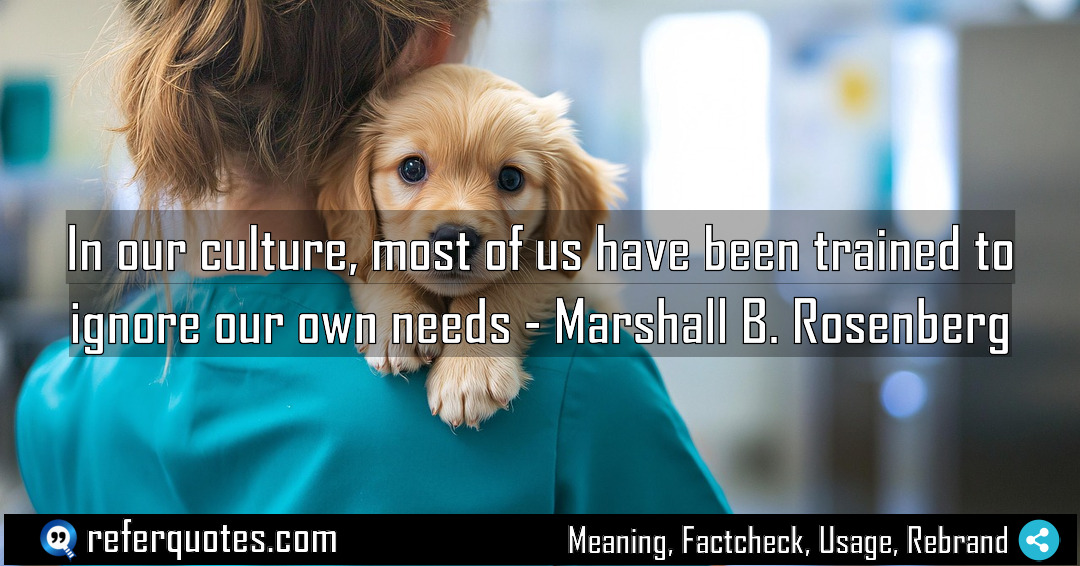
You know, when Marshall Rosenberg said, “In our culture, most of us have been trained to ignore our own needs,” he hit on something so fundamental. It’s that quiet, pervasive programming that tells us our own needs are secondary, an indulgence rather than a necessity for a functional life.
Share Image Quote:
Table of Contents
Meaning
The core message is that we’re culturally conditioned to prioritize the needs and expectations of others over our own, to the point where we often don’t even recognize what we truly need.
Explanation
Let me break this down for you. This isn’t about being selfish. It’s about noticing the invisible rulebook we all carry. From a young age, we get rewarded for being “good,” which usually means being quiet, compliant, and putting others first. Our own needs for rest, for play, for expressing emotion? They get labeled as inconvenient or demanding. So we learn to suppress them. We build a life around what we *should* do, and we lose the language for what we genuinely *need* to feel fulfilled and alive. It’s a slow, quiet erosion of self.
Quote Summary
Reading Level80
Aesthetic Score70
Origin & Factcheck
This insight comes straight from Marshall B. Rosenberg’s seminal work, Nonviolent Communication: A Language of Life, first published in the United States back in 1999. It’s a cornerstone of his NVC methodology, and while the sentiment feels universal, this specific phrasing is uniquely his.
Attribution Summary
Where is this quotation located?
| Quotation | In our culture, most of us have been trained to ignore our own needs |
| Book Details | Publication Year: 1999; ISBN: 9781892005038; Last edition: 3rd Edition (2015); Number of pages: 264. |
| Where is it? | Chapter 5: Taking Responsibility for Our Feelings, Page 85 (2015 edition) |
Context
Within the book, this statement acts as a crucial diagnosis before presenting the cure. Rosenberg lays this out early on to explain *why* we need a new language of compassion. He argues that because we’re so disconnected from our own needs, we can’t possibly express them clearly or hear the needs of others without judgment and conflict. It’s the “why” behind the entire NVC framework.
Usage Examples
So how do you actually work with this? It starts with awareness.
- For the burned-out professional: Next time you feel resentful about staying late, pause. Ask: “What need of mine is not being met here?” Is it for respect for your time? For work-life balance? Naming it is the first step to addressing it.
- For the overwhelmed parent: When you’re running on empty, instead of just powering through, check in. “My need for rest or support isn’t being met.” This isn’t a failure; it’s vital data.
- In a tense relationship: Before launching a complaint (“You never listen!”), translate it. That’s often a tragically expressed need for connection, understanding, or to be heard.
The audience for this is literally everyone. But it resonates deeply with caregivers, people-pleasers, and anyone in a helping profession who gives and gives until there’s nothing left.
To whom it appeals?
Share This Quote Image & Motivate
Motivation Score75
Popularity Score75
Shareability Score70
FAQ
Question: Isn’t focusing on my own needs just being selfish?
Answer: This is the biggest misconception. Selfishness is demanding your needs be met at the *expense* of others. Self-connection is about acknowledging your needs so you can find strategies to meet them *without* blaming others. It actually leads to more compassionate relationships.
Question: How do I even start to identify my needs? I’m so out of practice.
Answer: Start with your feelings. Frustration, anger, sadness? They are all brilliant alarm bells signaling an unmet need. When you feel them, get curious, not critical. Ask “What do I need right now?” The answer might be simple: peace, autonomy, companionship.
Question: Is this cultural training the same everywhere?
Answer: Great question. The intensity varies, but the pattern is widespread. In many Western cultures, it’s about individualism that paradoxically demands self-sacrifice for productivity. In more collectivist cultures, the pressure to serve the group can be even more pronounced. The core mechanism of ignoring the self is eerily similar.
Similar Quotes
Our cultural conditioning leads us to focus on judging others instead of understanding their needs. It’s a game-changer for communication, shifting you from blame to genuine connection. This insight fundamentally…
The way you treat yourself sets the standard… it’s a simple but profound truth. It’s less about ego and more about the invisible signals you broadcast to the world every…
Every emotion offers a message and a lesson… it’s a game-changer. It means our feelings aren’t random noise; they’re data. Ignoring them is like deleting a crucial file about yourself.…
Letting people fail is part of letting them learn. It’s a tough but essential leadership truth that separates good managers from great ones. You have to create a space where…
You teach others how to treat you every time… it’s a powerful truth. It means your daily interactions, both spoken and unspoken, actively shape your relationships and the respect you…
